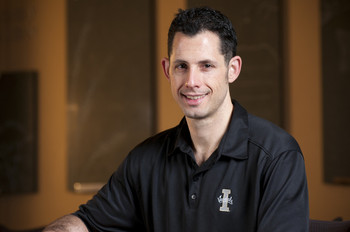Climate change keynote to lead off conference
 Dr. John Abatzoglou, a University of Idaho Professor, will provide the opening keynote for the Spokane River Forum Conference. John is a leading researcher and thinker on climate change in general, and what it means to the Rocky Mountain West in particular.
Dr. John Abatzoglou, a University of Idaho Professor, will provide the opening keynote for the Spokane River Forum Conference. John is a leading researcher and thinker on climate change in general, and what it means to the Rocky Mountain West in particular.
John’s interest in climate change dates back to a childhood fascination with meteorology, wondering about what was behind the weather forecasts glibly provided on TV. The journey led him to a degree in Atmospheric Science, then a doctorate degree in Earth System Science at University of California campuses.
“The more you learn, the more you want to learn,” said John. “How things are connected and explaining it to others became a passion that led me to this work.”
“We all know from our daily lives that climate is made up of thousands of little weathers. The occurrence of cold spells, heat waves and snowfall extremes are variable from year to year. Changes in climate include changes in the magnitude and frequency of notable weather extremes that get us all talking about the weather. Researching climate is about understanding trends and possible impacts beyond what our eyes tell us day to day or year to year.”
2015 provides a useful example that will be the subject of much conversation at the conference. Was early runoff, low snowpack and a hot summer the “new normal” of climate change? Or was it just one of those unusual years that happens every so often?
Said John, “It’s hard not to look at atmospheric, hydrologic and other data collected over the years and not see change. And the way things are changing are broadly consistent with human induced climate change.”
John will present on some of the specifics to consider in our area, including some counter intuitive thoughts. For instance said John, “A warmer atmosphere can hold more moisture, and hence with warming we expect increases in precipitation intensity. This can translate into bigger mid-winter snowfall events in areas that are currently sufficiently cold for snowfall. Now hold that thought while I tell you summer temperatures are also much hotter.”
John and other presenters at the conference are also quite active in the discussions of how to manage in this emerging reality. Last year for instance, crops came in three to four weeks ahead of schedule. Beyond water storage, the question is whether to encourage growing crops that do well early.
Wildfire and fish are other examples. Do you do more controlled burns and forest thinning to mitigate increased risks of hotter, dryer summers? What can be done for cold water fisheries facing lower flows and warmer water temperatures?
Like many researchers and natural resource managers the Forum has become fortunate enough to know, John is not running around with a sky is falling message. Their message is far more nuanced and at times optimistic. They see a changing world but embrace the possibilities for a bright future.
“There will be winners and losers in a changing climate. Proactive planning that incorporates science-based perspectives of the changing environment will help regions preserve what’s precious to them. Failure to accommodate or prepare for what’s coming down the pipeline will likely have ramifications later in the 21st century.”
